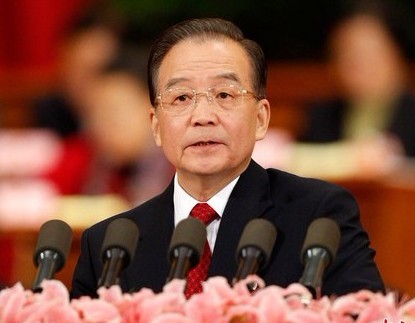李肇星:
時間已經超過中午12點,為了讓更多的記者朋友有機會提問,經請示總理,我們記者會的時間再延長十來分鐘。
It’s already past 12 but to give more journalists more opportunities to ask questions, I have solemnly consent to the Premier to extend the press conference by about 10 minutes.
新加坡《聯合早報》記者:
我們想請問關于“十二五”規劃的問題。我們留意到中國的知識界對于“十二五”規劃給予了很高的評價,認為它為中國的未來指明了更好的方向。但是中國有一句話叫知易行難。轉變經濟增長方式這個概念早從上個世紀90年代中期就一直提到今天,請問溫總理,您認為“十二五”規劃要得到真正地實施,真正地貫徹落實,最難的地方在哪里?
I’m with Lianhe Zaobao of Singapore. My question is also about the 12th Five-year Plan. We have seen that the academic community has spoken highly of this plan, holding the view that it charts the future course for China’s development. But we also know that as a Chinese saying goes “it is easy to identify a problem but it’s not easy to act on it”. Actually, the concept of transforming the economic development pattern has been repeatedly mentioned ever since the middle of the 1990s. So my question is: Mr. Premier, what poses the biggest difficulty in ensuring the effective implementation of the 12th Five-year Plan?
溫家寶:
你提到轉變發展方式知易行難,最難難在什么地方?我以為難在兩個方面:一是觀念;一是創新機制和干部考核的標準。所謂創新機制,其實決定一個國家發展的主要在教育和科技。我一直強調,中國的振興不單在經濟總量,而根本在人才和科技進步,并且要建立和完善鼓勵科技進步、人才成長的機制。通過改革促進產學研的結合,我以為有兩個數字比GDP更為重要,一是教育經費占國民經濟的比重;一是研發經費占生產的比重。這兩條就決定了我們這個民族和國家的創新力量,這才是最有力、最持久、最可靠的發展因素。所謂觀念,就是要徹底轉變唯GDP的觀念。推動經濟社會發展,改善人民生活,需要不斷地增加經濟總量,但是這種總量的增加是不能以過度地消耗資源、能源和污染環境為代價。那樣不僅不可持續,而且會給我們子孫后代造成影響。與它相關的就是干部政績的考核。我以為對干部政績的考核,最重要的不僅要看一個地區的經濟總量,而且要看經濟與社會發展的協調,社會事業的發展和社會的進步,公平正義和人民生活的改善。如果不徹底從根本上解決這兩條,我們現在制定的計劃也是難以實現的。謝謝。

We have set the target of transforming China’s economic development pattern as you rightly put in your question. It’s easy to identify a problem but it’s difficult to act on it. You asked what poses the biggest difficulty in achieving this objective. I think I can give you a two-fold answer: First, I think we must transform our mindset. And second, I believe it is essential for us to boost the innovation capabilities and in particular related aspect that is we must set out the right criteria in evaluating the performance of government officials in pursuing China’s development. With respect to the mechanisms for enhancing our innovation capability, I would like to say that I believe education, science and technology development play an essential role in pursuing overall development in China. I have always emphasized that to achieve China’s revitalization, it is not just about how big the economy is. It is also about and more
新華社和中國新華新聞電視網記者:
總理您好。去年農民收入的增長是27年來首次超過了城鎮居民。請問總理,這是否意味著在扭轉城鄉差距擴大的進程中出現了一個拐點?“十二五”時期能否保持住這種變化的趨勢?謝謝。
I’m with Xinhua News Agency and China Xinhua News Network Cooperation. Last year that was for the first time in 20 years we saw that farmer’s incomes grew faster than urban incomes. Does that indicate a reversal of the widening income gap between urban and rural areas in China and will this momentum continue this year?
溫家寶:
應該說這些年來,農民的收入有大幅度的增長,到去年達到5119塊,增長幅度超過10%,也超過了城鎮居民收入的增長幅度,這是一個可喜的現象。農民收入的增長大致是三個來源。第一是農產品,或者說是叫農業收入。我們在2006年全部免除了農業稅,當年中央財政的補貼就達到1326億元。與此同時,我們開始對農民實行生產補貼,每年的補貼額超過1200億元。此外,我們在農村實行了免費的9年義務制教育,并且對貧困地區和貧困家庭的孩子,免除了書本費和住宿費。在中等職業學校,我們還特別規定,來自農村的孩子和學農專業的孩子全部免費。這些都是農民收入增長的一個重要因素。但是更為主要的,就是我們消除了農民進城的歧視。現在農民進城務工的多達2.42億人,農民的工資性收入占到50%。第三是部分農民還有財產性收入。農民收入應該說有了很大的提高,但是我們不能盲目樂觀,農業基礎還不夠鞏固,農民收入增長也還不夠穩定。農民收入的增長是我們實現社會公平,特別是收入分配公平的一個極為重要的方面。為此,我們還要做出極大的努力。比如,我們前幾年農產品的價格提高了20%-40%,今年在這個基礎上,我們實行的最低收購價繼續大幅提升。我們正在貫徹關于積極穩妥地實行戶籍制度改革,讓符合條件的農民工進城落戶。同時,著力解決農民工生活和工作存在的問題,包括培訓、子女上學和社會保障。所有這些我覺得都會進一步提高農民的收入。
In recent years, the farmer’s incomes in China have been rising fairly fast. Last year, farmer’s income reached 5,919 RMB yuan. And for the first time, it increased faster than urban income. It rose by over 10%. This is indeed encouraging. There are three main sources of the farmer’s income: First, in 2006, we fully rescinded agricultural taxes, and for that year, the central government allocated 132.6 billion yuan for this purpose. At the same time, we have raised the production subsidies for farmers and this year, the figure will exceed 120 billion RMB yuan. In the rural areas, we have introduced the free 9-year compulsory education. We have exempted the textbook fees and expenditures for living on campus for rural poor students. Moreover, the secondary vocational education has been made free of charge for rural students and students who have agriculture-related majors. This is an
溫家寶:
最后,在座的有日本記者嗎?
Do we have Japanese journalists present here today?
我想說幾句話,我不是讓你提問啊。
Not to give you an opportunity to ask question but I just want to say a few words here.
三天以前,日本遭受了歷史上罕見的特大地震災害,給日本人民的生命財產造成了巨大的損失。我想借此機會,向在這次災難中遇難的日本人民表示深切的哀悼,向全體日本人民表示誠摯的慰問。中國也是一個多地震的國家,我們感同身受。在汶川發生特大地震的時候,日本政府派了救援隊,并且給中國以物資上的支援。我們的救援隊昨天已經到達日本,我們運送的救災物資也到達了日本。我們將根據日本的需要,愿意繼續提供必要的幫助。請你代為轉達。
Actually, I have a message that I hope you will convey to the Japanese people. Japan was hit by a devastating earthquake 3 days ago. The earthquake has inflicted an enormous life and property loses. So I want to use today’s opportunity to extend our deep condolences to the lost lives in this disaster and to express our sincere sympathies to the Japanese people. China is also a country that is prone to earthquake disasters, and we fully empathize with how the Japanese people feel now. When the massive earthquake hit Wenchuan of China, the Japanese government sent a rescue team to China and also offered rescue supplies. The Chinese rescue team arrived in Japan yesterday. And we have provided relief supplies to the Japanese side and we will provide more in light of the needs of the Japanese side.
李肇星:
感謝溫總理,也感謝張璐譯員,也感謝各位記者朋友,總理記者見面會到此結束。再見!
Thank you, Mr. Premier!











